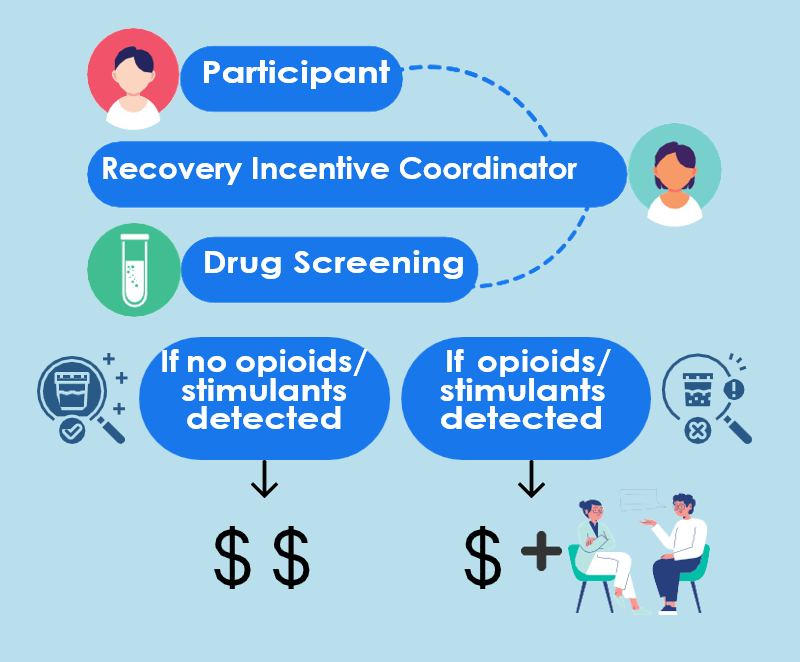The web Browser you are currently using is unsupported, and some features of this site may not work as intended. Please update to a modern browser such as Chrome, Firefox or Edge to experience all features Michigan.gov has to offer.
Recovery Incentives Pilot
What is the Recovery Incentives Pilot?
The Recovery Incentives Pilot will use contingency management, an evidence-based treatment that provides motivational incentives to people living with a substance use disorder who are able to achieve their treatment goals. By establishing contingency management as a covered benefit on a pilot basis for Medicaid and Healthy Michigan Plan enrollees, the state believes it can improve outcomes by supporting individuals in making the behavior changes that drive recovery.
The purpose of this pilot is to:
- Improve access to effective community-based SUD treatment and recovery services.
- Address the SUD crisis in Michigan through a new evidence-based treatment.
- Improve the health and well-being of Medicaid and Healthy Michigan Plan (HMP) beneficiaries living with either stimulant use disorder (StimUD) and opioid use disorder (OUD), or both.
How does Contingency Management Work
Substances, such as stimulants and opioids, can take over the natural reward pathway in the brain. By providing immediate rewards to individuals who meet their treatment goals, contingency management helps to revert that pathway in the brain into balance by offering people non-drug rewards in exchange for choosing abstinence. This immediate reward can help tip decision-making towards abstinence.
Who is Eligible to Receive Recovery Incentives?
To be eligible to participate in the Recovery Incentives Pilot, individuals should:
- Be enrolled in Medicaid or HMP.
- Be diagnosed with either a qualifying Stimulant Use Disorder or Opioid Use Disorder.
- Be enrolled in a participating Prepaid Inpatient Health Plan (PIHP).
- Participating PIHPs:
Recovery Incentives Pilot Design
- Participants will receive incentives for meeting their treatment goals by providing negative drug tests for stimulants and/or opioids and for continuing to engage in treatment even when they have a positive test. Incentives will be provided to participants as gift cards to purchase certain items, such as food and gas.
- Incentives will increase each week a participant does not use stimulants and/or opioids.
- Incentives will reset to a lower amount when a participant's test shows they used a stimulant and/or opioid or has an unexcused absence. The participant’s incentives will increase after they provide negative drug tests.

What is the timeline for launching the RI Pilot?
MDHHS anticipates launching the Pilot on January 1, 2025. Interested providers should reach out to their PIHPs to join their Recovery Incentives network.
Resources
- Recovery Incentives Pilot Handbook (PDF)
- Recovery Incentives Program Fact Sheet (PDF)
- Recovery Incentives Concept Paper (PDF)
- For questions regarding the Pilot contact MDHHSRecoveryIncentives@michigan.gov
News
- July 16, 2024: Proposed Policy for Recovery Incentives Pilot Posted for Public Comment
MDHHS has posted a proposed policy for the Recovery Incentives Pilot here. Please send comments to MDHHS-RecoveryIncentives@michigan.gov by August 20.
- June 4th, 2024: MDHHS approves eight PIHPs to expand substance use treatment with Recovery Incentives Pilot (Press Release)
The Michigan Department of Health and Human Services (MDHHS) approved eight pre-paid inpatient health plans (PIHPs) to participate in the Recovery Incentives Pilot. This pilot, supported by $6 million in opioid settlement funds over the next three years, will expand access to evidence-based treatment for Medicaid and Healthy Michigan Plan enrollees who are living with certain substance use disorders (SUDs).
- February 23rd, 2024: Invitation for Public review and Comment - Michigan 1115 Behavioral Health Demonstration
The Michigan Department of Health and Human Services, Behavioral Health and Physical Health and Aging Services Administration is seeking a five-year extension of the §1115 Behavioral Health Demonstration. Current authority expires September 30, 2024
- Public Notice (PDF) and Public Hearing Information (PDF).
- For more information, visit: https://www.michigan.gov/mdhhs/keep-mi-healthy/mentalhealth/drugcontrol